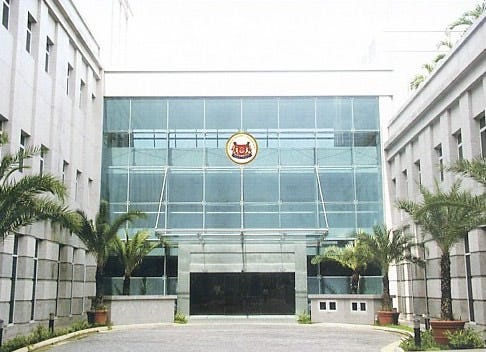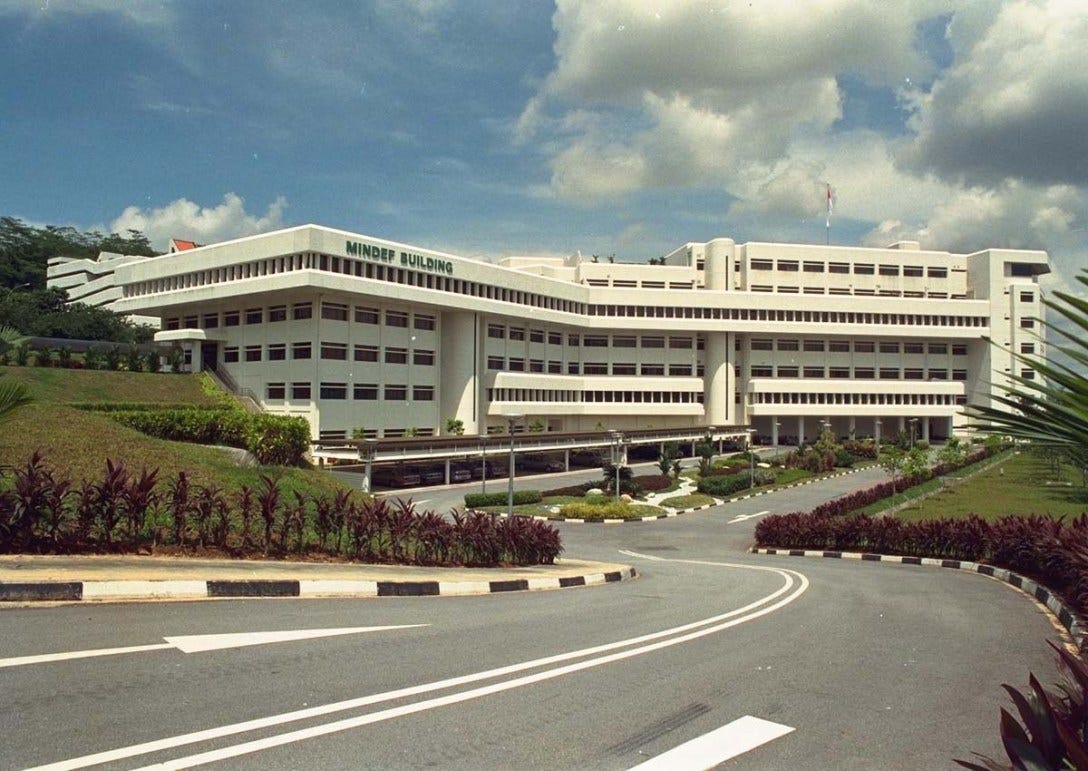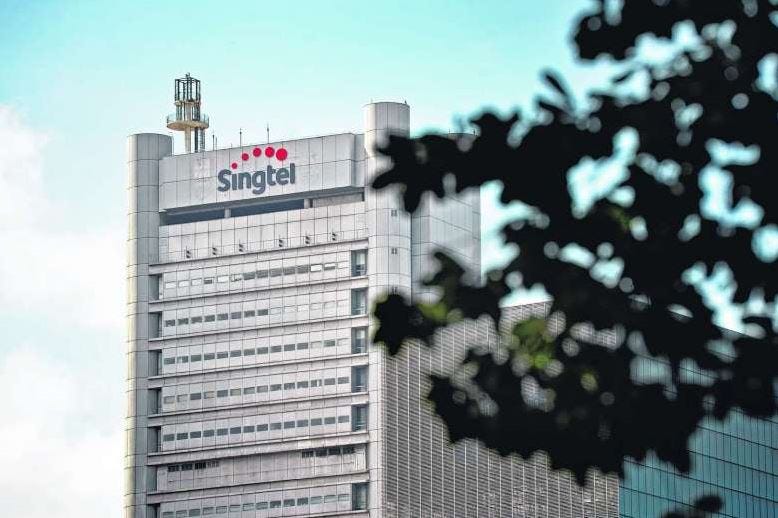Picture above ISD Headquarters
Singapore is an anomaly in Southeast Asia. It has staunch connections with the US and Israel and a network of varied corporate interests all around the world. It is a small, primarily non-Muslim city-state surrounded by much larger, occasionally antipathetic Muslim countries. Sovereignty disputes on the South China Sea are continuing, and unpredictable events like Sulu militants invading Lahad Datu in Sabah continue to occur. Singapore's security is of prime domestic importance.
The potency and effectiveness of Singapore's intelligence services was seen in the 1990s with the successful recruitment of Australian intelligence officers to pass on sensitive information to Singaporean intelligence at the DSD (now Australian Signals Directorate) listening station at Cabarlah, near Toowoomba, Queensland.
Even though Singapore has initiated a number of security programs like the Eyes-in-the-Sky (EiS) program with Malaysia and Indonesia to protect the Melaka Straits, and undertakes joint surveillance of the South China Sea with Malaysia, using land, sea, and air based assets, Malaysia and Indonesia are still very suspicious of Singapore's intentions.
In particular, Indonesia is very concerned that Singapore has been colluding with Australia and the United States with spying activities within Indonesia, recently calling the Singapore Ambassador to Jakarta for an explanation. The majority of Indonesia's international telephone and internet traffic is routed through Singapore, which leaves the country very vulnerable to Singapore's SIGINT programs.
Singapore has extensive military links with other nations of the Western block with air force squadrons based in France, the United States, and Australia. These relationships are also firmly embedded in the intelligence arena.
The Singapore Special Branch was the forerunner to the Security Intelligence Division under the Ministry of Defense (SID) and Internal Security Division (SID) under the Home Ministry. The Special Branch was set up by the British and later Singaporean operatives were trained by Australians who operated the old Kranji SIGINT listening post before its closure in 1974. Due to historical reasons, both the SID and ISD have a strong anti-communist culture.
The role of the SID is to gather and analyze intelligence related to the national security of Singapore. The SID has an external focus and undertakes clandestine activities like it did in supplying weapons to anti-communist fighters in Cambodia during the 1980s. The internal component is the Internal Security Department, or ISD which confronts and addresses threats to national security, international terrorism, border protection, racial tensions, fraud against the state, foreign subversion, and espionage.
SID headquarters, hidden within MINDEF
The ISD controls the internal Security Act which allows for detention without trial for up to two years. It is the ability to incarcerate suspect terrorists for long periods of time without legal redress, not allowed in most Western countries, that has allowed the ISD to develop an understanding of the reasons why people become terrorists, valuable knowledge for other Western intelligence agencies. Members of the both the SID and ISD work throughout all parts of the civil service and diplomatic missions around the world. It is believed that even Singapore Airlines and other regional airlines are infiltrated by agents of ISD/SID.
The prime SIGINT function in relation to the "five eyes" collaboration, according to Philip Dorling of the Sydney Morning Herald, is in partnership with Britain, The United States, and Australia in intercepting data and telecommunications by tapping undersea cables that link Asia, the Middle East and Europe, under a program called TEMPORA. The two major fiber optic cables are the SEA-ME-WE-3 running from Japan, via Singapore through Djibouti, the Suez, the Straits of Gibraltar, to Northern Germany, and the SEA-ME-WE-4, from Singapore to Southern France.
Both these cables come to land on the Western side of Singapore at Naval base in Tuas. Cable interceptions are very important because they carry around 9 percent of the world's internet traffic. They also carry telephone and SMS data. Singapore intelligence Division plays a major role in intercepting around 30% of the world's data traffic for the "five eyes" network.
One of Singapore's most strategic corporate intelligence assets is SingTel. SingTel owns equity in a number of Asian Mobile networks including AIS Thailand, Telkomsel Indonesia, Airtel Africa and South Asia, Globe Telecom in the Philippines, and Citycell in Bangladesh. One reason why the then Howard Government did not oppose the SingTel takeover of Optus in 2001, which included the Aussat Satellite which carried Australian military communications was because of the close intelligence cooperation Australia had with Singapore, although this was not disclosed to the public at the time. Countries like Indonesia rely very heavily on Singapore owned telecommunications infrastructure. This is worrying to the Indonesian leadership to the point where it is beginning to become an issue within the relationship.
Singtel plays an important role
However, the role SingTel has played in intelligence has been vitally important to the ability of the US and Australia to expand eavesdropping capabilities in the region. The relationship of SingTel to the intelligence community can be seen by Peter Ong's position on the board of directors as the government representative. Ong, head of Singapore's public service, was before that the official responsible for national security and intelligence coordination in the Singapore Prime Minister's office.
Singapore is almost unique in that no court warrants are required to make phone taps and data interception. All phone, SMS, and internet activities are closely watched by the ISD. In addition, the ISD can access any CCTV around the island state and has the latest facial recognition capabilities, uses mobile phones and car toll units as tracking devices, as well as tapping into credit card data through the local banking system.
Releases by former US National Security Agency employee Edward Snowden allege that Singapore diplomatic missions are assisting Australian and US diplomatic missions in eavesdropping on telephony, SMS, and other data traffic from their own diplomatic missions within the region. The island state has a number of air assets including C-130 WSO, Fokker 50MP and Israeli supplied Gulfstream G550 business jets with AEW, SIGINT, and ELINT capabilities. This is now supplemented with E-2C Hawkeyes, and the latest Global-Hawk RQ-4 early warning and SIGINT capability equipped UAVs. These assets undertake maritime surveillance, and signals interception within the South China Sea area. A reliable source also has indicated that there is a signals interception station within the Ministry of Defense Headquarters at Bukit Gombak in Singapore, operating in a similar manner to the ASD facility at Shoal Bay, near Darwin. In addition to being linked with the five eyes intelligence services, Singapore's Joint Counter Terrorism Center is also linked with the United States Pacific Command (PACOM) joint intelligence center.
Singapore's HUMINT operations were stepped up dramatically after 911 where it was believed the country would be in danger due to its physical location and pro-Western attitudes. Islamist groups like Jemaah Islamiyah (JI), Abu Sayyaf, and Kumpulan Mujahidin Malaysia (KMM) started developing a strong foothold in the region, especially with a number of terrorist attacks in Indonesia. A number of successful arrests were made of terrorists, however the ISD became embarrassed with the escape of Jemaah Islamiyah leader Mas Selamat Kastari from one of its facilities in 2008.
Singapore provides many benefits to the Western intelligence community in terms of special expertise in language, strategic position, and being a member of ASEAN. At the top level, Singapore has fostered the development of a number of new think tanks and institutes such as S. Rajaratnam School of International Studies (RSIS) established in 2007, and the Institute for Defense and Strategic Studies (IDSS)within RSIS, where many foreign academic and security experts have been employed to undertake "top-end" security analysis of the region. Some of these institutions are also partly funded by security agencies to undertake specific studies and analysis of interest.
One concern is that this growth in intelligence collection really has very little to do with terrorism and crime, but rather commercial interests. The death of Shane Todd in Singapore sheds a light on the relationship between industry and espionage, where there were concerns that the Chinese phone company Huawei was involved in espionage. Taxpayer money is being used to protect the intellectual property of private corporations.
Even though Singapore has been able to develop some cooperation with regional allies through programs like Eye-in-the-Sky (EiS), it is of a very limited nature as each country’s forces are not allowed encroach upon another's territorial waters. ASEAN security summits have really got nowhere. Singapore's enthusiastic participation in five eyes surveillance programs has created a foreign policy dilemma as it appears contrary to its own regional interests, and therefore national interests, if the integration of Singapore with the rest of the region through bodies like ASEAN is a priority.
Singapore has failed to be a major shaper of the ASEAN agenda. The country’s ethnic make-up has not assisted it in developing any special relationship with China. Singapore is fast becoming an Asian anomaly, a stranger in its own home, out of synch with the rest of the region. It's a situation not unlike Israel, or Cuba in the extreme. This in the medium to long term will be counterproductive to its own National Security Strategy of prevention, protection, and response, and consequently national security.
This Singapore's ruling elite have trouble seeing this, and as a consequence the very events they may be trying to prevent occurring on Singapore shores may become more highly probable. This may be so because of the "sphere orientation" Singapore's cooperation with five eyes countries is creating, in relation to the rest of the region.
Consequently, Singapore must expect many more "please explain" requests from its near neighbors if it continues to carry on with the occidental five eyes countries without developing some form of local intelligence arrangement within ASEAN itself. However, the lack of cooperation within ASEAN over AEC project doesn't generate much optimism in this respect. Island Singapore may thus just remain Island Singapore in an estranged relationship with the region it cannot geographically escape from.
Originally published in the Asia Sentinel 10th December 2013





